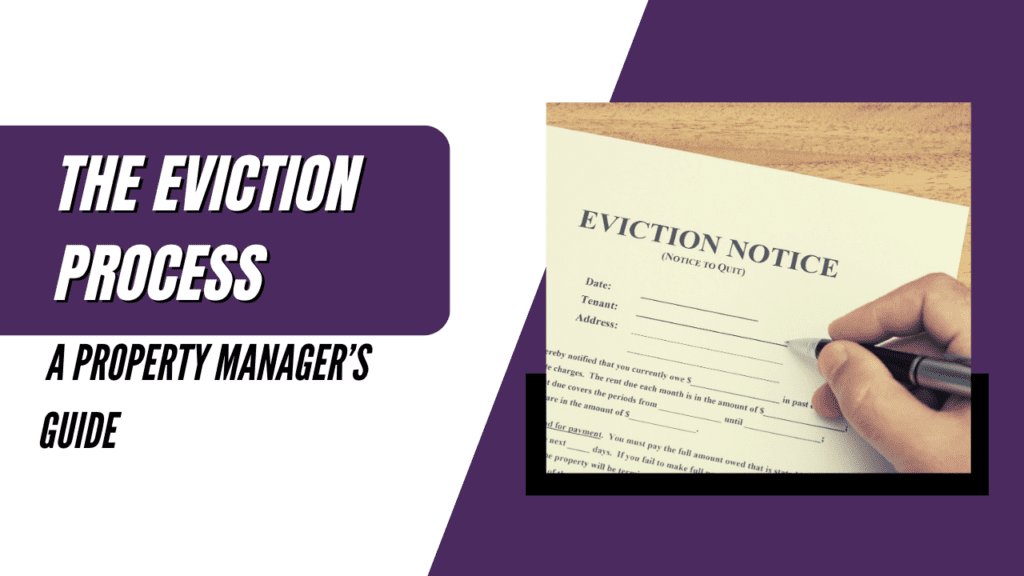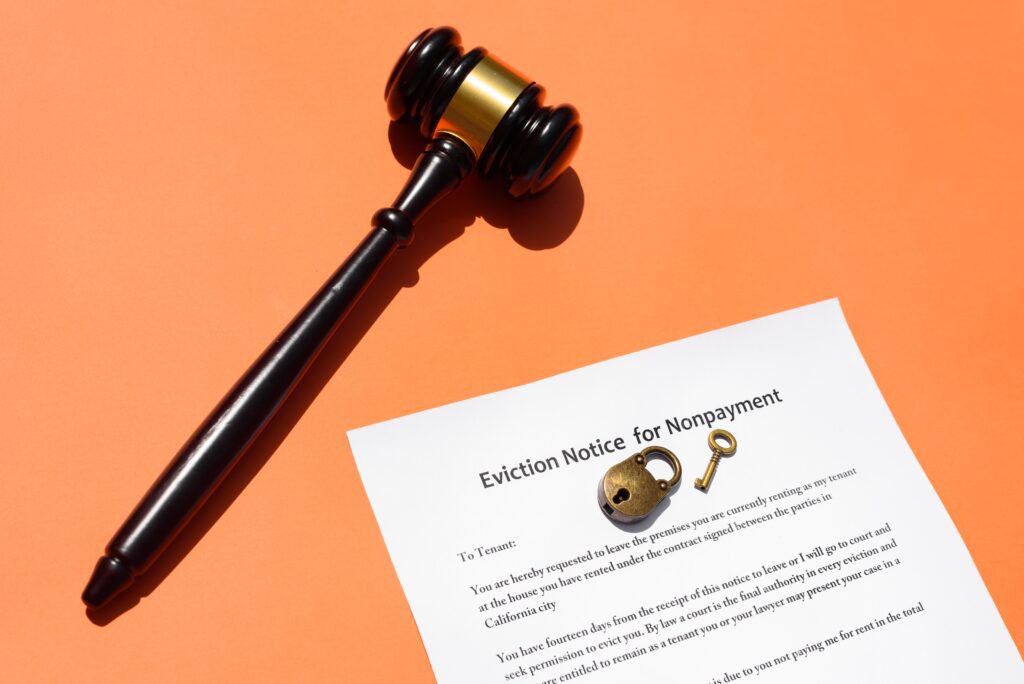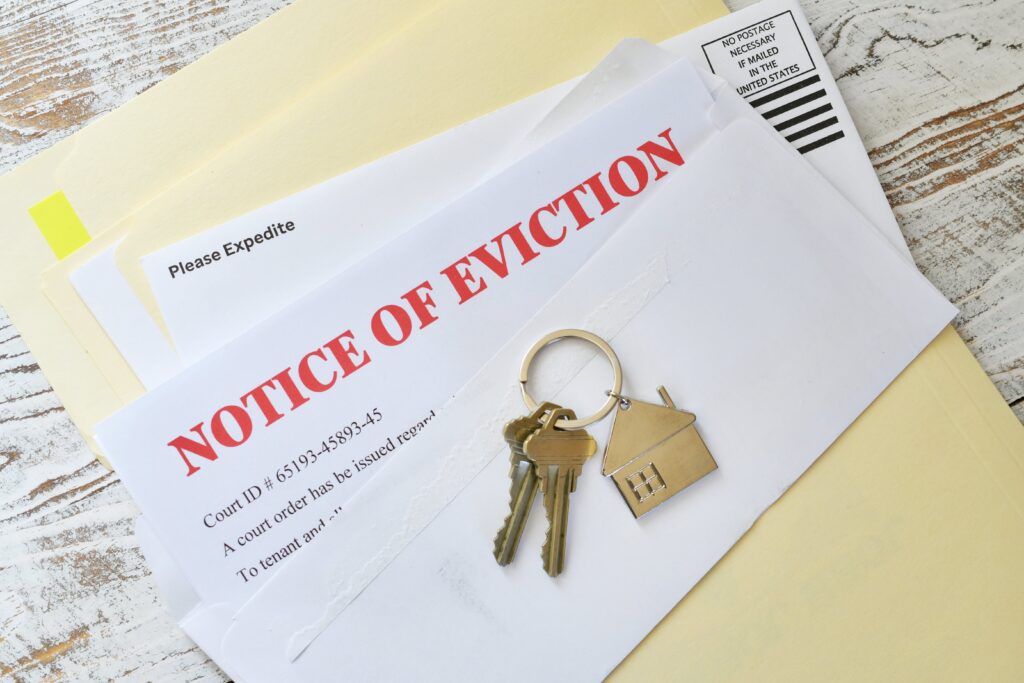
The easiest evictions are those you manage to avoid. This has always been true for us at Realty Solutions, and we’d rather motivate tenants to continue paying rent and catch up with any late rent so they can stay in place and not be removed from their home.
Working with tenants is always the best option when you’re thinking about an eviction. But sometimes, tenants work overtime to avoid you or they refuse to work with you on a payment arrangement or payment plan. Your good intentions are not always returned.
In those cases, you need to evict. It’s important you understand the process, otherwise you’ll find yourself spending more time and more money removing a tenant from your property.
We have a legal team supporting our property management efforts, and it helps us to move quickly and efficiently through the eviction process.
Let’s talk about what that process is. Hopefully, you’ll never need to conduct an eviction. If you do, however, you want to be as prepared and knowledgeable as possible.
WHY WOULD YOU EVICT A TENANT IN SOUTH JERSEY?

New Jersey has outlined some key reasons that a landlord or property manager might lawfully evict a tenant. There are more than a dozen of legally specific reasons that you can evict a tenant. These are the most common.
Reasons to Evict Found Here
|
Nonpayment of Rent |
Frequently Late Rental Payments |
Repeated Disorderly Conduct |
|
Property Damage or Destruction |
Violation of the Lease Agreement Terms |
Health and Safety Standards Require Demolition |
If you have documentation that one of these conditions have been met and you’re ready to evict, you can’t just go ahead and notify the tenant that they have to leave. Several legal protections are in place for tenants in New Jersey, and one of the most important parts of the New Jersey eviction laws is this:
Only a Special Civil Part officer can evict a tenant from a property.
You do not have the right to evict the tenant on your own, without the help of an officer or a legal Judgment for Possession. The property owner or property manager is required to file a landlord tenant lawsuit in the Special Civil Part of the Superior Court. Once the case has been won, there will be a Judgment for Possession from the court. At that point, an officer can be directed to evict your tenant.
If you find yourself removing a tenant without a Judgment for Possession, you’re conducting an illegal lockout. If you’re evicting without the presence of a Special Civil Part officer, you’re also conducting an illegal lockout.
HOW TO EVICT WHEN TENANTS DO NOT PAY RENT

You don’t have to be a South Jersey property management expert to know the most common reason that tenants are evicted from their property. It’s for nonpayment of rent. That’s what we’ll focus on here – the steps you should take when your tenant has not paid and you need to escalate the process of getting them out of your property.
First Things First: Do You Have a Consistent Rent Collection Policy?
This is where eviction prevention starts. You need a well-stated and documented rent collection policy in place. You need to include it in your lease agreement, and you need to reinforce your expectations with your tenants before they move in.
Here are the elements of a good rent collection policy.
 |
|
Pro Tip: We’ve found that online payments are extremely effective at getting rent paid on time. Set up a system or a portal where tenants can pay electronically with ease, security, and convenience. You’ll find you’re chasing down late rent less often.
|
|
We have a standard automated rent collection process which includes specific actions on each day of the month. Our process is in writing, and we use the same language, and there’s never any confusion in our process.
On the 20th of the month, our property managers will need to decide if it’s time for eviction. Usually, it is. We don’t want to wait longer than the 20th day to begin the eviction process. |
Next: You Have a Rent Collection Policy and You Enforce it, But Rent Still is Not Paid. Now What?
Here are the steps you’ll take to evict your tenant when rent isn’t paid and they’re not responding to your attempts at communication.
Step 1: Send a Formal Notice
You’re actually not required to serve a notice to your tenants when you’re evicting because they’ve missed a rent payment.
BUT…
We think it’s a good idea. It puts your tenant on formal notice that the eviction is coming. It also establishes a deadline that must be met in order for the eviction not to be pursued. Mail, serve, or post a notice that informs the tenant their rent is delinquent. Give them three days or five days to pay the rent. If they don’t, the notice tells them that you will file an eviction motion in court.
Step 2: File a Complaint
Now we’re off and running. You will file a complaint with the Landlord/Tenant Section of the state Superior Court’s Special Civil Part in your County. This complaint gives the tenant formal notice that they will need to show up and court and defend themselves against this eviction lawsuit.
Most counties will allow for an online filing. You’ll upload a copy of your lease agreement and an “information statement,” which is simply a summary of the situation and why you’re evicting.
Step 3: Tenant is Served the Complaint and Court Date Scheduled
The case is docketed and a Special Civil Part officer serves the complaint to the tenant.
The first appearance is likely to be online. The court will hold a case management conference for the landlord, the tenant, and a court-trained mediator who will be looking for the appropriate paperwork and documentation. An agreement will try to be reached to avoid court. The tenant may promise to pay or they may agree to move out before the legal eviction. If mediation is not successful, a hearing will be scheduled.
Step 4: Court Hearing
After the mediation, the court will send out a scheduled hearing date. At that point, the case will be heard. Depending on where you are and the volume of cases your court system has, the hearing will be conducted online or in person. Landlords and tenants can still work out a settlement together and avoid trial.
Generally, if a tenant doesn’t appear in court, the judge enters a default in the landlord’s favor while the tenant will have the case dismissed if the landlord does not appear.
Step 5: Winning Your Eviction Case
If you have all of your documentation in order and you can prove that rent has not been paid, you will receive a Judgment for Possession from the court. The tenant will have three business days to leave the property once this judgment is served. Then, you can file for a Warrant for Removal, which is the document you need for a Special Civil Part officer to physically remove the tenant and allow the property owner to change the locks.
HERE’S THE THING…
It’s not over till it’s over.
Like, really over.
In New Jersey, a tenant can return to their rental property if they pay all the rent and fees that are owed within three business days after being locked out.
It’s true.
You can get through the entire eviction, win the case, and change the locks.
But if the tenant comes up with overdue rent within three days, you have to let them back into the property.
There’s your step-by-step on how to evict a tenant who has not paid their rent. Remember that at any point during the eviction process, if the tenant comes up with rent, you have to stop the process, accept the payment, and move along.
That’s why consistent delinquencies are another reason to evict. Maybe you have a tenant who pushes the envelope every single month. You can keep moving through the eviction process with that tenant or you can try to evict them for frequent delinquencies.
We call these tenants “frequent flyers.”
Profile of The Frequent Flyer
 Frequent flyers are very good at paying late every month but getting the money to us before there’s a lockout or a court date. For these tenants, we know they understand our rent collection process and our eviction process, and we stick to it. We don’t bypass our process or work on payment arrangements with people who are actively trying not to pay rent. We give them every opportunity to pay before evicting, but we do not waiver from our process.
Frequent flyers are very good at paying late every month but getting the money to us before there’s a lockout or a court date. For these tenants, we know they understand our rent collection process and our eviction process, and we stick to it. We don’t bypass our process or work on payment arrangements with people who are actively trying not to pay rent. We give them every opportunity to pay before evicting, but we do not waiver from our process.
In our experience, you’ll avoid eviction for nonpayment of rent when you have standard practices, consistent enforcement of those practices, and some compassion for the tenants who are working really hard to stay in their property.
WHEN YOU NEED TO EVICT FOR OTHER REASONS
Maybe it’s not a rental payment thing. Maybe it’s another issue.
Earlier in this blog, we highlighted six of the main reasons a South Jersey property manager or landlord may need to evict a tenant. There are actually 17 legal reasons to evict in New Jersey. Curious about what those reasons are? Good, we’re going to share them.
What You Need to Know
The eviction process for all of these eviction types follows generally the same format as the steps we listed above, except for one important difference: The Notice Period is Required!
As we said, we always recommend serving a formal notice to your tenants before you begin the eviction process for nonpayment. But, nonpayment of rent is the only eviction that does not require a notice. These evictions do require a formal service of notices, and we’re letting you know more about that.
Handy Chart for Eviction Reasons and Their Notice Periods

| Failure to Pay Rent | No Notice Needed |
| Disorderly Conduct | Three Days |
| Damage to the Property | Three Days |
| Substantial Violation of Lease Agreement | One Month (with opportunity to cure) |
| Breach of Covenants or Agreements | One Month |
| Tenant Pays Rent Late Habitually | One Month |
| Failure to Pay Rent Increase | One Month |
| Health or Safety Violation and Property Comes Off Rental Market | Three Months (tenants may be eligible for financial assistance) |
| Landlord Wishes to Stop Renting the Home to Tenants | 18 Months |
| Tenant Refuses to Accept Lease Changes | One Month |
| Home is Converting to Condo, Co-op, or Fee Simple Ownership | Three Years |
| Tenancy After Conversion to Condo, Co-op, Fee Simple | Two Months |
| Tenant Employed On-site Loses the Job Tied to Residency | Three Days |
| Drug Conviction and Offense Committed On Property | Three Days |
| Conviction of Assaulting or Threatening Landlord or Family Members | Three Days |
| Civil Court Action Holding Tenants Accountable for Crimes | Three Days |
| Conviction for Property Theft | Three Days |
There’s your comprehensive list. You’ll need to attach a copy of your formal notice to the complaint when you file it with the courts.
If you happen to live in a property that includes a unit or two that you rent out, you may evict tenants if they do not move out at the end of a lease that was not renewed, after you have given proper notice.
LOOKING TO AVOID EVICTIONS?

If you find yourself having to evict a tenant for any reason, we strongly urge you not to do it alone. There are a lot of easy mistakes that can be made. In fact, we’ve written about those mistakes in another blog, which you might want to read.
Talk to an attorney or a property manager. Better yet – talk to a company that’s staffed with both property managers and attorneys (that’s us). We can help you work through the court process without any mistakes or risk. It’s frustrating to wait for the legal process to move along. We’re here to help it move a little more efficiently.
Or, you can count on our advice for avoiding evictions altogether. Here are some of our best practices for preventing eviction.
Screen South Jersey Tenants Well
The screening part is a bit of a no-brainer.
If you want good tenants who can be trusted to pay rent on time and take care of your property, take the time and invest the resources to screen them carefully. You want to dig into their backgrounds and find out what kind of tenants they’ve been in other rental homes.
There are always the standard things to look for:
- Credit checks. You don’t need a tenant with perfect credit, but you do want a tenant who is not drowning in debt.
- Eviction history. Approving a tenant for your property who has been evicted previously is just asking to go down the eviction road with them again. Maybe the eviction was 15 years ago and they have a solid rental history since then. That might be okay. But, a tenant with two evictions in the last five years is not a tenant you want in your property.
- Criminal history. Recent convictions for drugs, assault, or violent crimes are not what any landlord wants to see, and it could lead to an eviction while the tenant is in your property.
- Income standards. If a tenant does not earn enough income, you might stop receiving the rent. Generally, you want tenants to earn three times the monthly rent.
Go beyond those general screening practices and talk to former landlords. The last two landlords will be able to tell you whether the tenant you’re considering paid rent on time, took care of the property, followed the lease terms, received a full security deposit refund, and managed their pets. You can ask if they gave proper notice before moving out and if they’d rent to the tenant again.
Establish Tenant Relationships
Get to know your tenants. When the relationship is positive and professional rather than adversarial, you are less likely to evict.
Collect an Adequate Security Deposit
You’re permitted to collect a security deposit up to one-and-a-half month’s rent. It’s a good idea to at least collect the equivalent of one month’s rent. This will help when you’re waiting to remove a non paying tenant.
Let us help you with avoiding evictions and if necessary, managing them. Please contact us at Realty Solutions. We lease, manage, and maintain homes in Audubon, Collingswood, Cherry Hill, Haddon Heights, Blackwood, and the surrounding communities.

